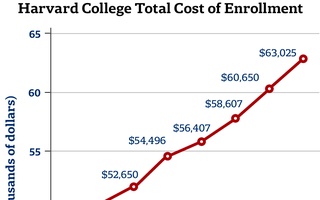With Amorino Gelato and Sweet Pizza looking to open stores on JFK Street, Harvard Square continues a recent trend of welcoming upscale food venues. Recently, Blue Bottle, a cafe described by one student as “yet another bougie addition,” announced its arrival in Harvard Square by next summer. And it's hard to forget that Panera Bread abruptly closed just last year, only to be replaced by its far more expensive cousin, Tatte.
Whether or not you appreciate Tatte’s polished white brick and marble interior, its presence reflects a pressing fact: there are fewer and fewer affordable food options in Harvard Square. While this trend may inconvenience many, it will most directly impact the college experiences of low-income students. It is very likely that the rising costs of restaurants will continue to exacerbate divides within the student body along socioeconomic lines because of who can and cannot afford to eat in the Square.
In recent years, administrators and students alike have been aware of the issue. When talking about the newly implemented start-up grant, former Undergraduate Council president Shaiba Rather ’17 explicitly acknowledged the issue of restaurant affordability, saying “it can be really overwhelming when your roommates or all your friends are eating out every day.” The College's new start-up grant, given to incoming freshmen from households making $65,000 or less, is an important first step in ensuring equal participation in campus life regardless of socioeconomic background. Given the intense debates about social inclusivity on campus, fueled by a running conversation on unrecognized single-sex social organizations, these grants are imperative. They are a tangible and uncontroversial way to promote inclusivity, and we hope that this ongoing three-year pilot program proves the continued need for these grants.
That said, there are still many shortcomings with the College’s support of low-income students. The start-up grant is new, having only been established this past fall and, as a pilot program, it is only guaranteed to freshmen until the Class of 2022. Additionally, it does not address the financial constraints that low-income upperclassmen face: students ought to be supported all four years of college, not just freshman year. Finally, students from households just above the $65,000 threshold do not qualify. All these issues pose challenges that Harvard should help address.
The administration can help support low-income students given the changing urban landscape of Harvard Square, but it is important that peers also shoulder some of the responsibility. All students should be sensible and empathetic when making plans, for instance by proposing a meal in a dining hall instead of in the Square to help ensure financial accessibility for all parties.
The increased presence of upscale restaurants will inevitably affect Harvard students, and it is important that students and administrators alike acknowledge that it will do so unequally across socioeconomic levels. As Harvard Square changes, it is imperative that the College’s financial aid and support for low-income students changes as well.
Read more in Opinion
A Chorus of Diverse VoicesRecommended Articles
-
Cambridge Tenants Will Demonstrate For Better HousingCambridge tenants will rally at noon today at the office of Intergovernmental Relations to protest University housing policies. At the
-
Well-AppropriatedAfter years of neglect, federal higher education funding is finally getting the respect it deserves—at least if President Bush can
-
 College Forms ‘Start-Up’ Freshman Grants, Increases Tuition
College Forms ‘Start-Up’ Freshman Grants, Increases Tuition -
Starting Up CollegeWe are excited by this change and see it as an innovative way to make students from low-income families feel more comfortable as they adjust to campus.
-
 Median Family Income for Harvard Undergrads Triple National Average, Study Finds
Median Family Income for Harvard Undergrads Triple National Average, Study Finds













